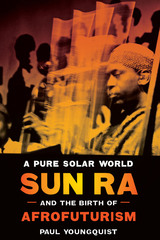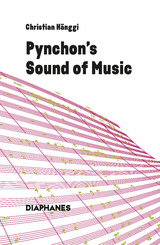104 start with P start with P

Surveying the range of Sun Ra’s extraordinary creativity, this book explores how the father of Afrofuturism brought “space music” to a planet in need of transformation, supporting the aspirations of black people in an inhospitable white world.
Sun Ra said he came from Saturn. Known on earth for his inventive music and extravagant stage shows, he pioneered free-form improvisation in an ensemble setting with the devoted band he called the “Arkestra.” Sun Ra took jazz from the inner city to outer space, infusing traditional swing with far-out harmonies, rhythms, and sounds. Described as the father of Afrofuturism, Sun Ra created “space music” as a means of building a better future for American blacks here on earth.
A Pure Solar World: Sun Ra and the Birth of Afrofuturism offers a spirited introduction to the life and work of this legendary but underappreciated musician, composer, and poet. Paul Youngquist explores and assesses Sun Ra’s wide-ranging creative output—music, public preaching, graphic design, film and stage performance, and poetry—and connects his diverse undertakings to the culture and politics of his times, including the space race, the rise of technocracy, the civil rights movement, and even space-age bachelor-pad music. By thoroughly examining the astro-black mythology that Sun Ra espoused, Youngquist masterfully demonstrates that he offered both a holistic response to a planet desperately in need of new visions and vibrations and a new kind of political activism that used popular culture to advance social change. In a nation obsessed with space and confused about race, Sun Ra aimed not just at assimilation for the socially disfranchised but even more at a wholesale transformation of American society and a more creative, egalitarian world.


Setting aside clichés of Tchaikovsky as a tortured homosexual and naively confessional artist, Philip Ross Bullock paints a new and vivid portrait of the composer that weaves together insights into his music with a sensitive account of his inner emotional life. He looks at Tchaikovsky’s appeal to wealthy and influential patrons such as Nadezhda von Meck and Tsar Alexander III, and he examines Russia’s growing hunger at the time for serious classical music. Following Tchaikovsky through his celebrity up until his 1891 performance at New York’s Carnegie Hall and his honorary doctorate at the University of Cambridge, Bullock offers an accessible but deeply informed window onto Tchaikovsky’s life and works.

A pyramid in front of the Louvre. Buffalo Bill's Wild West Show and The Rite of Spring. Schoenberg and Shirley Temple. Just as the odd juxtapositions of Modernism produced a new way of seeing, so now collage, in the hands of Glenn Watkins, offers a new perspective on the art of our age. A rich and revealing picture of twentieth-century music and the arts, Watkins' work shows us what our present Postmodern aesthetic owes to our Modernist past.
Behind the many guises of Modernism we find an appetite for opposing impulses: the exotic and the home-grown, high and low, black and white, the passionate and the cool, the cerebral and the instinctive. Watkins shows us these oppositions at play in the music of Stravinsky and Ravel, Debussy and Schoenberg, Ives, Satie, Hindemith, Ellington, and Gershwin, in the art of Picasso and the Cubists, Cocteau, Léger, Brancusi and Noguchi, in the anthologies of Nancy Cunard and Main Locke, in the ballet companies of Sergei Diaghilev and Rolf de Math, and in the performances of josephine Baker. Throughout, collage asserts its power to enlighten through juxtaposition, resist resolution, sponsor pluralism, and promote understanding of an order that eludes all edicts.
The masks of Oskar Schlemmer, of japanese No drama, and of the commedia dell'arte, the mythologies attendant to the retrieval of folk traditions and the emergence of jazz, and the mass relocation of artists in a time of war-all have a place in this depiction and assessment of the legacy of Modernism. A heady exploration of questions surrounding Primitivism, Orientalism, and technology as they surface at either end of our century, this book exposes the millennial preoccupations mutually invested in our search for "first times" and our convictions about "the end of culture"
READERS
Browse our collection.
PUBLISHERS
See BiblioVault's publisher services.
STUDENT SERVICES
Files for college accessibility offices.
UChicago Accessibility Resources
home | accessibility | search | about | contact us
BiblioVault ® 2001 - 2024
The University of Chicago Press









